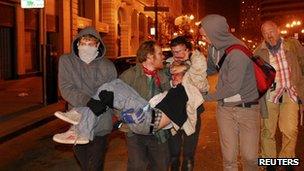Occupy Oakland seeks strike after Scott Olsen injury
- Published

Occupy Wall Street organisers say Scott Olsen was hit in the head with a police tear gas canister
Activists taking part in the the Occupy Oakland protests have called for a general strike, external in the city.
The call to strike on 2 November emerged as protesters gathered late on Wednesday, one day after clashes with police left an Iraq veteran badly hurt.
On Tuesday evening police used tear gas and baton rounds to force protesters to leave their camp. Many have now called for the mayor of Oakland to resign.
Occupy Wall Street protests are now in their sixth week.
On Wednesday night up to 1,000 people filled the plaza outside Oakland's City Hall to continue the protest, groups of people marched down the streets, reports said.
There were no clashes with police on Wednesday night, and the numbers on the streets were smaller than the previous night.
Solidarity
The man injured on Tuesday was named as Scott Olsen, a 24-year-old former US marine who, according to his friends, has served two tours in Iraq.
He remains in hospital with a fractured skull, but reports say his condition has improved from critical to fair and the veteran has been moved into an intensive care unit.
He was struck in the head with a heavy object, but it is not known what kind of object or who might have thrown it.
A group called Iraq Veterans Against the War claims it was thrown by police.
Oakland Police Chief Howard Jordan said an investigation into Mr Olsen's injury has been raised to a "level one" incident - the highest priority for an internal policy report.
"The irony is not lost on anyone here that this is someone who survived two tours in Iraq and is now seriously injured by the Oakland police force," Mr Olsen's friend, Adele Carpenter, told Reuters news agency by phone from the hospital waiting room.
Unreasonable force
In New York, where the Occupy movement started, hundreds of protesters marched in solidarity with Occupy Oakland on Wednesday evening.
There were fears the show of force seen in Oakland could happen in other cities.
"Yes, we're afraid. Is this the night they're going to sneak in?" William Buster, a protester in New York, told the Associated Press news agency on Wednesday night.
"Is this the night they might use unreasonable force?"
On the same evening a crowd of around 1,000 also gathered in Portland, Oregon, in a solidarity protest organised by the AFL-CIO labour union.
On Tuesday, Atlanta also saw around 50 arrests as police tried to move protesters out of Woodruff Park.
The crackdowns came as a congressional analysis said income for the wealthiest Americans had sharply increased in the last 30 years - up by as much as 275% for the top 1%.
Meanwhile, the bottom 20% saw income rise by just 18%.
Complaints about income inequality are among the most prominent grievances of those who have joined the Occupy protests, which also focus on perceptions of corporate greed and political inaction.
- Published14 October 2011
- Published7 October 2011